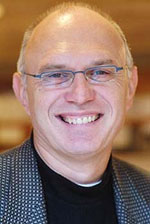Miroslav Volf is the Director of the Yale Center for Faith and Culture and Henry B. Wright Professor of Systematic Theology at Yale Divinity School. He was born in Croatia, and studied at Evangelical-Theological, Osijek, Fuller Theological Seminary and received his doctoral degree from the University of Tübingen, where he studied under Jürgen Moltmann.
As “a member of the Episcopal Church in the U.S.A. and the Evangelical Church in Croatia, Professor Volf was involved in international ecumenical dialogues (for instance, with the Vatican Council for Promotion of Christian Unity) and interfaith dialogues (most recently in Christian-Muslim dialogue).” His recent books include Captive to the Word of God: Engaging the Scriptures for Contemporary Theological Reflection (2010), Allah: A Christian Response (2011), and A Public Faith: How Followers of Christ Should Serve the Common Good (2011). His Exclusion and Embrace. A Theological Exploration of Identity, Otherness, and Reconciliation (1996) was selected as one of the top one hundred books of the twentieth century by Christianity Today and received the 2002 Grawemeyer Award.
Book Basics
A Public Faith: How Followers of Christ Should Serve the Common Good is a collection of essays and lectures created between 1994 and 2008, which were revised for inclusion in this volume. Volf offers introductory remarks to this reworked material in addition to a substantive concluding chapter. Making a strong case that there is no one way for people of the Christian faith to relate to the culture as a whole, he explores what it looks like for Christians to counter faith’s malfunctions in the contemporary world, become aware of the richness of the Christian view of what it means to live well in this world, and to live well in a multi-religious culture.
As Christianity has moved from the dominant religion in America (and in the Western world more generally) toward the margins, people who follow the way of Jesus are rightly focusing greater attention on the proper role of faith in the public square. Volf’s book offers a way forward that is plausible, theologically sound, adaptable to ever shifting cultures and respectful of all people – including those of other faiths and those who do not practice a faith. Everyone who follows the way of Jesus and wants to live life well in their given Western culture should read this book and allow it to become a part of the ongoing conversation they have with others and with themselves.
Identity and Difference
I find the book’s fifth chapter, “Identity and Difference,” to be the most compelling. Originally presented as a lecture at “The Gospel in Our Pluralistic Culture” conference in 1994 in Bad Urah, Germany, Volf has given considerably more attention to reworking it than to other material that is included within this text (p.147).
In this chapter, Volf seeks to “make Christian communities more comfortable with being just one of many players, so that from whatever place they find themselves — on the margins, at the center, or anywhere in between — they can promote human flourishing and the common good” (p.79). Toward this end he presents four possible positions and suggests only the latter is able to adequately address
- The Liberal Program: Accommodation;
- The Postliberal Program: Reversing the Director of Conformation;
- The Separatist Program: Retreat from the World; and
- Internal Difference: A Better Way (p.84-93).
- Christians can simply adopt some elements of the cultures in which they live (ex: eating utensils);
- Christians can take up but also transform within the majority of elements within a culture (ex: language);
- Christians will need to reject some elements of the cultures in which they live (ex: slavery) (p.91-92).
Additionally, internal difference says no to both the idea of totally transforming the broader culture and to accommodating it, while embracing the opportunity to engage it (p.93-97).
So What?
Christian readers of this text will become better equipped to struggle with questions like
- What does it mean to live well in the culture in which I find myself today?
- What culture norms are most likely to cause my faith to malfunction and how can I address each?
- As a person of faith, how should I engage the larger multi-religious culture ?
Miroslav Volf. A Public Faith: How Followers of Christ Should Serve the Common Good (Brazos Press, 2011). ISBN: 9781587432989.
Note: For those who wish to explore this subject matter from the perspective of another author, I recommend To Change the World: The Irony, Tragedy, & Possibility of Christianity in the Late Modern World by James Davison Hunter (2010). You can read my review here.
